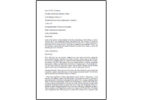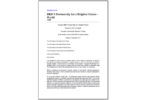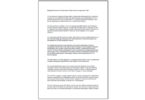-
- We, the Ministers of Foreign Affairs and Ministers in charge of economic cooperation of the People’s Republic of China and 50 African countries and the Chairperson of the African Union (AU) Commission, met in Beijing from 19 to 20 July 2012 for the Fifth Ministerial Conference of the Forum on China-Africa Cooperation (FOCAC).
- We express our thanks to H.E. President Hu Jintao of the People’s Republic of China and H.E. President Jacob Gedleyihlekisa Zuma of the Republic of South Africa, H.E. Thomas Boni Yayi, rotating Chairperson of the African Union and President of the Republic of Benin, H.E. President Teodoro Obiang Nguema Mbasogo of the Republic of Equatorial Guinea, H.E. President Ismail Omar Guelleh of the Republic of Djibouti, H.E. President Mahamadou Issoufou of the Republic of Niger, H.E. President Alassane Ouattara of the Republic of Côte d’Ivoire, H.E. Prime Minister José Maria Pereira Neves of the Republic of Cape Verde, Rt. Hon. Prime Minister Raila Amollo Odinga of the Republic of Kenya, and H.E. Mohamed Kamel Amr, Special Envoy of the President of the Arab Republic of Egypt, for attending the opening ceremony of the Ministerial Conference. We welcome the participation of the Republic of South Sudan and the AU Commission for the first time as Forum members.
- Under the theme of “build on past achievements and open up new prospects for the new type of China-Africa strategic partnership”, we reviewed with satisfaction the development of China-Africa relations, evaluated the implementation of the follow-up actions to the Fourth Ministerial Conference of the Forum held in Sharm El Sheikh, Egypt in November 2009, and agreed that the goals set at the Fourth Ministerial Conference had been accomplished. This has further consolidated the basis of and opened up even broader space for the development of China-Africa relations. We also held discussion and reached extensive consensus on the ways and means to further deepen China-Africa relations.
- We believe that the development of the new type of strategic partnership between China, the largest developing country, and Africa, the largest group of developing countries, is of great significance for the peace, stability and development of the world and serves the fundamental and strategic interests of both sides. As an important platform for collective dialogue and an effective mechanism of practical cooperation between China and Africa, FOCAC has played an irreplaceable role in promoting China-Africa relations. Both sides are ready to strengthen the building of FOCAC so that it will continue to steer China-Africa relations towards greater development.
- We have taken note that the international situation is undergoing profound and complex changes. Peace, development and cooperation are the calling of the times. The balance of power in the world is moving towards more equilibrium. Developing countries are playing an increasingly important role in international affairs. We call for further changes in the international system and order to make them just and reasonable and suited to the political realities of the world. We underscore the importance for Africa to assume its rightful place in the international arena.
- We are deeply concerned about the turbulences in certain regions and reaffirm our commitment to upholding the purposes and principles of the Charter of the United Nations and the basic norms governing international relations. We maintain that crises and disputes must be resolved peacefully through political means and advocate the security concept featuring mutual trust, mutual benefit, equality and coordination. We oppose interference in other countries’ internal affairs and wanton use or threat of force in international affairs.
- We stand for upholding the UN’s core position and role in international affairs, and reaffirm the need for reform of the United Nations. In this regard, we reaffirm that the historical injustices endured by African countries should be undone, and priority should be given to increasing the representation of African countries in the UN Security Council and other UN agencies.
- We are concerned that the global financial crisis is still spreading and deepening, and the world economic situation remains grim. We believe that countries around the world should work to pursue peace, promote development and resolve differences through cooperation, with a view to achieving stability and recovery of the world economy.
- We believe that the North-South imbalance in development is an important factor hindering the strong, sustainable and balanced growth of the world economy. We reaffirm the priority of the issue of African development in narrowing the North-South gap. We call on the international community to earnestly increase input, and give support and help to African countries in their efforts to realize the UN Millennium Development Goals.
- We appreciate the attention paid by the United Nations Conference on Sustainable Development, which was held in June 2012, on the issue of sustainable development in Africa. We hope that the international community will, in keeping with the principle of “common but differentiated responsibilities”, take concrete actions to implement the outcome of the Conference. We call on the international community to, under the leading role of the UN, take seriously the inefficient implementation in the field of sustainable development, show the political will and commitment to build consensus, and reach agreement on the implementation plan of the post-MDG framework of sustainable development. We also urge the developed countries to honor their assistance commitments to developing countries, African countries in particular.
Download






